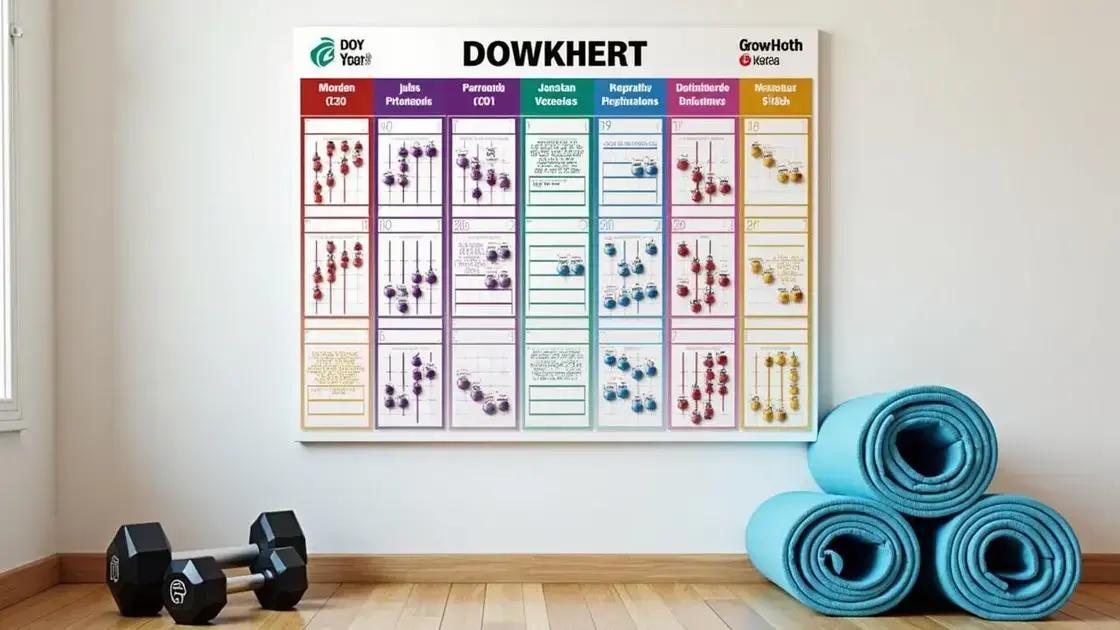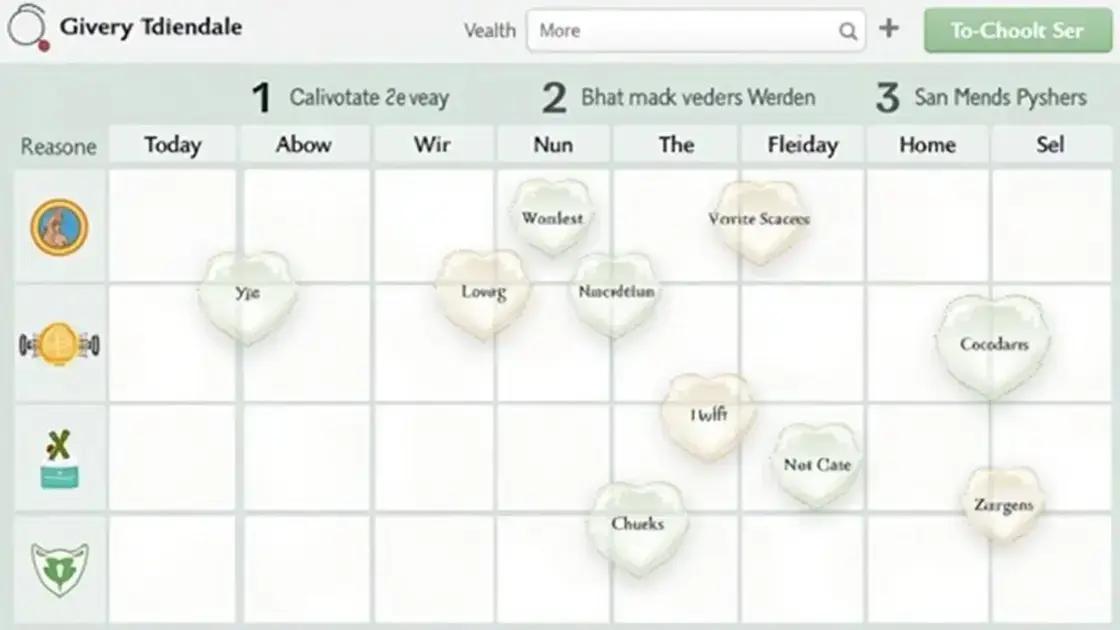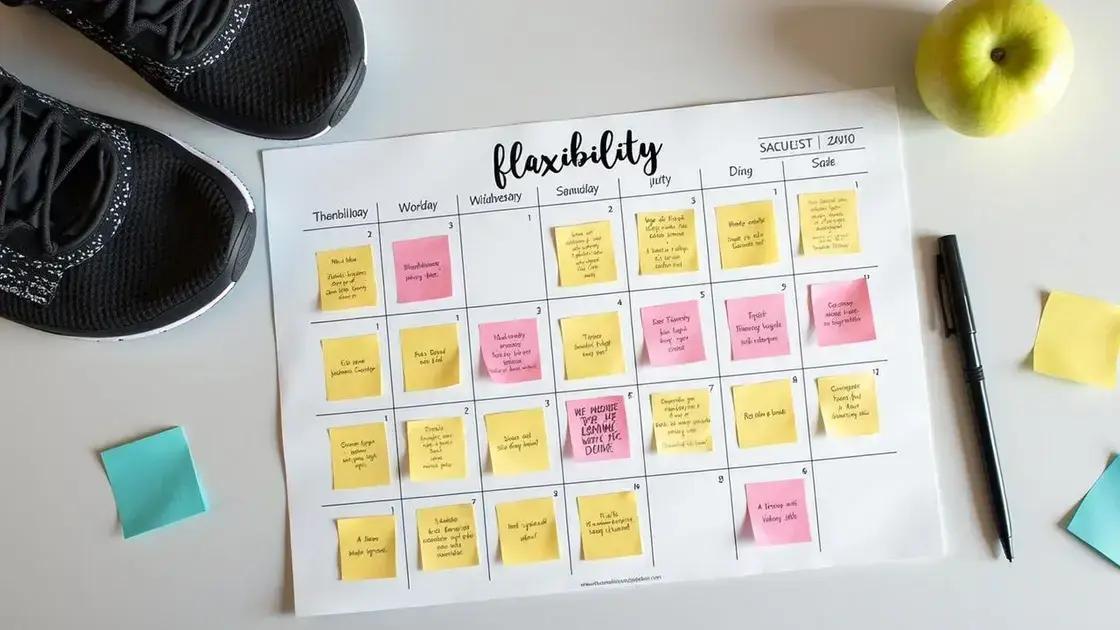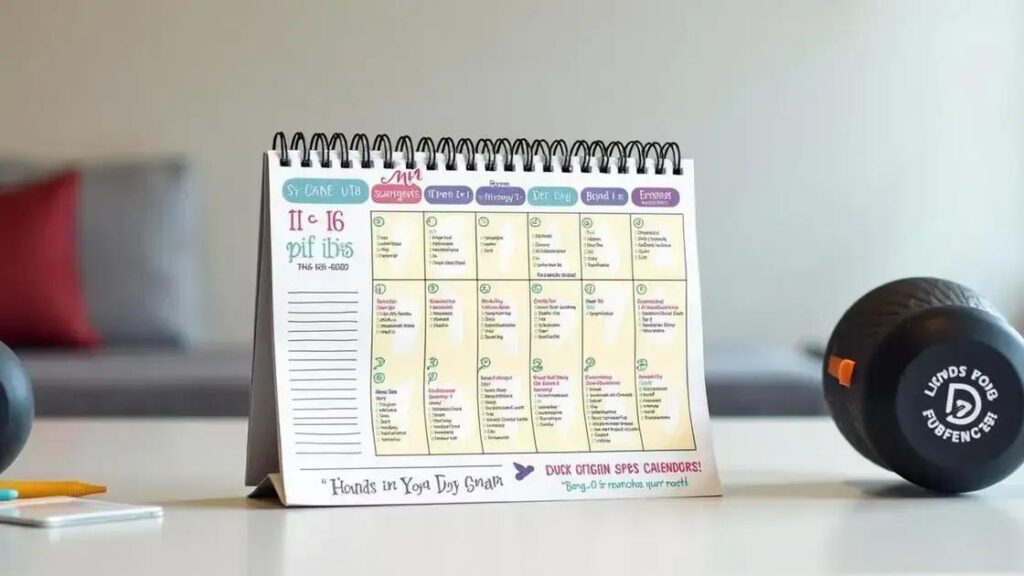Creating a fitness calendar for weekly accountability is essential for staying on track with your health and fitness goals. It helps you organize workouts, track progress, and adapt to life’s changes. By including rest days, using digital tools, and setting up check-ins, you can maintain motivation and flexibility while achieving success in your fitness journey.
Creating a fitness calendar for weekly accountability can be a game changer in achieving your health goals. By having a structured plan, you can visualize your workouts, track your progress, and ensure consistency in your fitness routine. In this article, we’ll discuss how to create an effective calendar tailored to your personal fitness journey, alongside tips to maintain your accountability throughout the week.
Understanding the Importance of a Fitness Calendar

Understanding the importance of a fitness calendar is crucial for anyone looking to stay on track with their fitness goals. A fitness calendar serves as a visual tool that allows you to organize your workouts and meal plans. By mapping out your exercises in advance, you can ensure that you are dedicating time to each aspect of your fitness journey.
Stay Organized
Using a fitness calendar keeps your workout schedule organized. Instead of scrambling to find time to exercise, you can plan your sessions around your daily activities. This leads to better time management and allows you to fit in workouts even on busy days.
Track Your Progress
With a fitness calendar, you can easily track your progress over time. Marking off completed workouts gives you a sense of accomplishment and motivates you to strive for your goals. It also helps in identifying patterns, like which days you are more likely to stick to your routine and which workouts are most effective.
Accountability
A fitness calendar enhances accountability. You can share your calendar with friends or family who can check in on your progress. This support system fosters a sense of community and encourages you to stay committed to your fitness plan.
Adaptability
A calendar allows you to adapt your fitness plan as needed. Life can be unpredictable, but having a structured calendar makes it easier to adjust your workouts without losing sight of your overall goals. You can rearrange sessions or swap exercises when necessary.
Steps to Create Your Fitness Calendar

Creating your fitness calendar can be an enjoyable and effective process. Follow these simple steps to get started on your fitness journey.
1. Set Clear Fitness Goals
Begin by defining your fitness goals. Ask yourself what you want to achieve within a certain timeframe. Whether it’s losing weight, building muscle, or increasing stamina, being specific about your objectives will guide the rest of your calendar.
2. Choose a Format
Decide how you want to create your calendar. You can use a digital tool, such as an app or spreadsheet, or opt for a physical planner. Pick the format that works best for you and is easy to access.
3. Include All Activities
Add not only workouts but also rest days, meal prep, and any other activities related to your fitness journey. Including these elements shows the full picture and helps you maintain a balanced approach. Remember, rest is as important as exercise!
4. Plan for Flexibility
While it’s essential to have a schedule, life can be unpredictable. Build in some flexibility by leaving gaps or buffer days in your calendar. This way, you can adjust workouts without losing momentum.
5. Review and Adjust Weekly
Each week, take time to review your fitness calendar. Check if you are sticking to your planned workouts and assess how you feel physically. Make necessary adjustments to ensure your calendar serves you well. This continuous evaluation is key for ongoing success.
Tips for Staying Accountable Weekly

Staying accountable weekly is an essential part of reaching your fitness goals. Here are some practical tips to help you remain focused and motivated.
1. Set Weekly Check-ins
Schedule a specific time each week to review your fitness calendar and assess your progress. During this check-in, ask yourself what went well and what could be improved. This reflection will help keep you on track.
2. Use a Buddy System
Find a workout partner who has similar goals. You can motivate each other by sharing your fitness calendars. Being accountable to a friend can make it easier to stick to your commitments.
3. Incorporate Rewards
Set small rewards for meeting your weekly goals. These could be anything from a favorite snack to a relaxing bath. Having something to look forward to will keep you motivated to stay accountable.
4. Adjust Your Calendar as Needed
Your fitness calendar should work for you. If you notice a particular workout feels overwhelming or you’re not enjoying it, feel free to adjust it. Adapting your calendar can keep your routine fresh and fun.
5. Celebrate Small Wins
Each week, acknowledge your achievements, no matter how small. Celebrating your progress reinforces positive behavior and provides motivation to continue. Remember, every workout counts toward your larger goals.
Adapting Your Calendar for Flexibility

Adapting your calendar for flexibility is important to sustain your fitness journey. Here are some key strategies to ensure your plan remains dynamic without losing focus.
1. Build in Buffer Days
When planning your workouts, include buffer days. These are days where you can shift workouts if something comes up. This way, you still keep your routine without feeling overwhelmed.
2. Mix Up Your Workouts
Incorporating a variety of workouts into your calendar can keep things interesting. If you’re not feeling up to a certain workout, switch it out for another. Variety helps avoid burnout and keeps you motivated.
3. Be Ready for Life Changes
Your life may change unexpectedly, so be prepared to adjust your calendar. If a new commitment arises, reassess your schedule and see where you can fit in your workouts, even if they are shorter or different than planned.
4. Listen to Your Body
Your body will let you know when it needs rest or a lighter workout. Pay attention to how you feel and adapt your calendar accordingly. Prioritizing your well-being allows for a sustainable fitness routine.
5. Revisit Your Goals Regularly
Set a schedule to review and revise your fitness goals every few weeks. If you find that your objectives have shifted, adjust your calendar to reflect these changes. Keeping your goals aligned with your current lifestyle makes your fitness journey more achievable.
In Conclusion: Achieving Fitness Accountability
Creating a fitness calendar for weekly accountability is an effective approach to stay committed to your health goals. By understanding the importance of a structured plan, setting clear objectives, and incorporating flexibility, you increase your chances of success.
Utilizing tools like buddy systems and regular check-ins helps maintain motivation while allowing for adjustments based on your progress. Remember, consistency is key, and celebrating small wins will keep your enthusiasm high.
With these tips in mind, you can confidently adapt your fitness calendar, ensuring it works for you in the best possible way. Empower yourself to stay accountable and enjoy the journey towards a healthier lifestyle.
FAQ – Frequently Asked Questions about Creating a Fitness Calendar
What is a fitness calendar?
A fitness calendar is a structured plan that outlines your workout sessions, rest days, and meal prepping activities, helping you stay organized and accountable.
How can a fitness calendar help me achieve my goals?
By visualizing your routine, a fitness calendar allows you to track your progress, maintain consistency, and make adjustments as needed to stay on target.
What should I include in my fitness calendar?
Include workout sessions, rest days, meal plans, and any other activities related to fitness like stretching or recovery exercises.
How often should I adjust my calendar?
Review and adjust your fitness calendar weekly to ensure it aligns with your current fitness levels, goals, and lifestyle changes.
Can I use a digital tool for my fitness calendar?
Yes, there are many apps and digital tools available that make it easy to create and manage your fitness calendar from your smartphone or computer.
What if I cannot stick to my calendar?
It’s important to remain flexible. If you miss a workout, simply reschedule it and ensure you don’t feel discouraged. Adapt your goals as needed.













